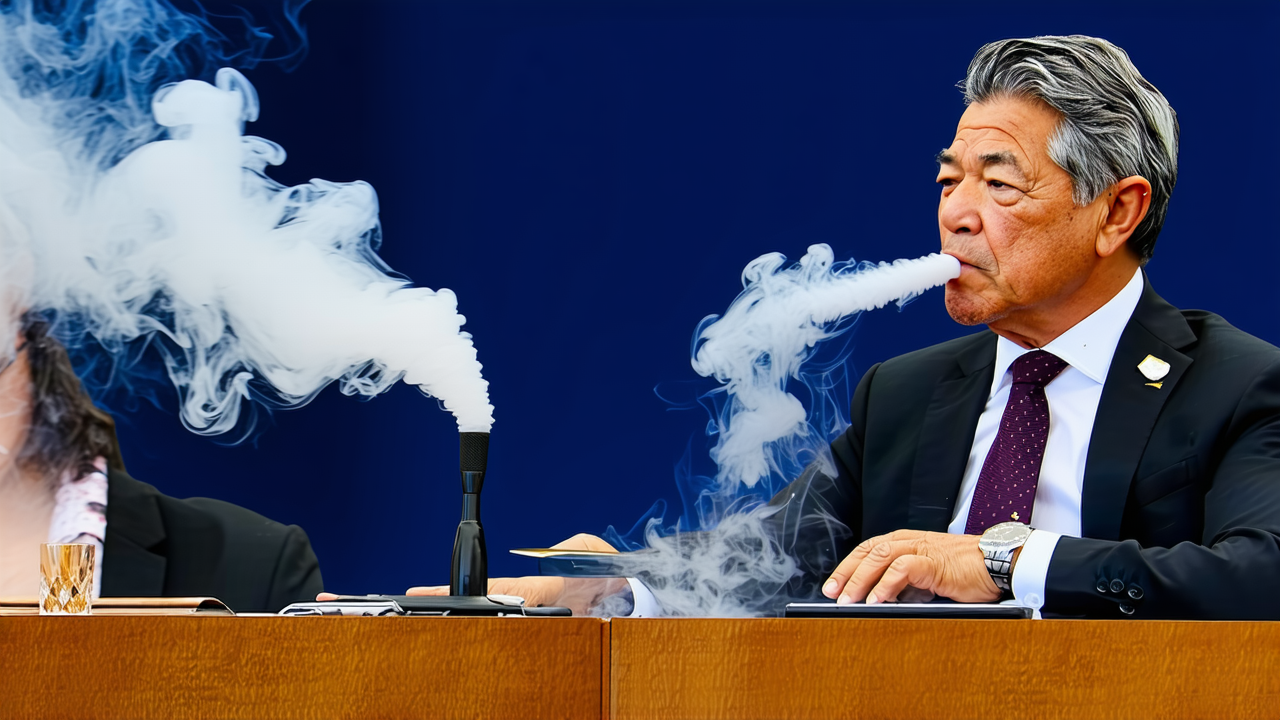Alleged Ties Between NZ First and Vaping Companies Pose 'Dangerous Risk' to Public Health, Advocacy Group Warns
Alleged Ties Between NZ First and Vaping Companies Pose 'Dangerous Risk' to Public Health, Advocacy Group Warns
A growing concern has emerged around the potential influence of tobacco and vaping companies on New Zealand First, with a prominent anti-vape advocacy group warning that these alleged connections could place the health of New Zealanders at significant risk.
Vape-Free Kids, a group dedicated to protecting children from nicotine addiction, has called on Prime Minister Christopher Luxon to remove New Zealand First from oversight of tobacco and vaping policy. The group's concerns stem from recent revelations by RNZ that suggest close ties between New Zealand First and Philip Morris, a major tobacco company.
According to the documents obtained by RNZ as part of a lawsuit against US vaping company JUUL, Philip Morris allegedly pitched draft legislation to NZ First as part of a lobbying campaign for its Heated Tobacco Products (HTPs). These documents, dated between 2018 and 2019, reveal that Philip Morris corporate affairs staff reached out to NZ First to secure regulations that would be beneficial to IQOS, the HTP with a monopoly in the New Zealand market.
The Bower Group Asia, which provided strategic advice to JUUL for its New Zealand launch, stated that NZ First leader Winston Peters has a relationship with Philip Morris and that any regulation he supports is likely to be industry-friendly and commercially driven.
Further concerns have been raised by the fact that two senior corporate communication positions at Philip Morris are held by individuals who previously held top roles within NZ First. David Broome, who served as chief of staff for NZ First between 2014 and 2017, now holds the position of external relations manager at Philip Morris. Apirana Dawson, who was director of operations and research in Winston Peters’ office from 2013 to 2017 and led the party’s election campaigns, is now the director of external affairs at Philip Morris.
Vape-Free Kids co-founder Charyl Robinson emphasized that these connections pose a “dangerous risk” to public health and urged the Prime Minister to take action. “It’s time for Prime Minister Christopher Luxon to remove the tobacco and vaping portfolio from New Zealand First,” she said. “He must step in and at the least reassign this portfolio to make it clear that public health policy in Aotearoa is not for sale.”
However, Luxon has publicly defended NZ First's involvement, calling Associate Health Minister Casey Costello a “great minister” and expressing pride in her record. Costello, who has previously made controversial decisions such as halving the excise tax on HTPs, has not addressed the allegations directly.
According to the World Health Organisation’s Framework Convention on Tobacco Control (FCTC), signatory countries must ensure that public health policies are not influenced by the commercial interests of the tobacco industry. New Zealand has committed to maintaining transparency in dealings with the tobacco industry, and since 2011, it has kept a public record of meetings with tobacco lobbyists.
Academic Melissa-Jade Gregan, who has studied the influence of the tobacco and food industries on politics, pointed out that New Zealand’s lobbying laws are too lax. “What we see through these documents isn’t a conspiracy — it’s standard practice for how these industries operate in New Zealand,” she said. “The tobacco and vaping industries, alcohol, junk food, they’ve developed a sophisticated, effective approach to political influence that takes full advantage of our complete lack of lobbying regulations.”
Labor health spokesperson Ayesha Verrall has called for stricter legislation to limit the influence of the tobacco industry on government. Verrall’s proposed bill would prohibit governments from supporting the interests of the tobacco industry and impose a six-month stand-down period for officials involved in tobacco policy before they can work for the industry.
As the debate over the influence of the tobacco and vaping industries on New Zealand’s policy decisions continues, the question remains: how can the government ensure that public health remains the priority, rather than the interests of the industry?
